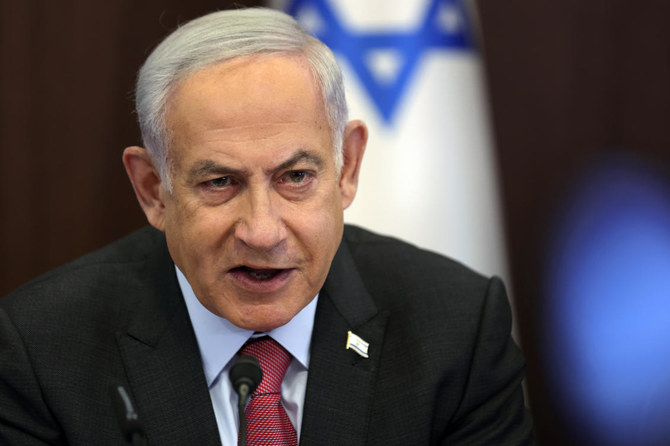JERUSALEM: Israel ratified a law on Thursday limiting the circumstances in which a prime minister can be removed, despite worries voiced by a government jurist that it may be meant to shield the incumbent Benjamin Netanyahu from any fallout from his corruption trials.
The amended definition for the “incapacity” of national leaders is among legislative measures by the religious-nationalist coalition that have tipped Israel into crisis, with the opposition arguing that judicial independence is in peril.
The coalition says the overhaul is aimed at pushing back against what it calls Supreme Court over-reach and restoring balance among branches of government.
By a 61-to-47 final vote, the Knesset approved the bill under which prime ministers can be deemed unfit — and compelled to step aside — either if they or three-quarters of cabinet ministers declare them so on physical or psychological grounds.
The stipulations fleshed out a quasi-constitutional “basic law” that provides the government with guidance in the event of a non-functioning prime minister — but which previously lacked details on circumstances that may give rise to such situations.
According to the Israel Democracy Institute think tank, the rule had earlier left Netanyahu vulnerable to a possible assertion of his incapacity by Attorney-General Gali Baharav-Miara, should she perceive an attempt by him to halt his three court cases.
The new law precludes this, IDI senior researcher Amir Fuchs said — while adding that he had considered such a finding by Bararav-Miara to be an unlikely “extreme case.”
Netanyahu denies all charges against him, and has cast the trials as a politicized bid to force him out of office.
Baharav-Miara — who was appointed by the former, centrist Israeli government — said last month that Netanyahu must stay out of his coalition’s push for a judicial overhaul because of what she deemed a conflict of interest arising from his trials.
Baharav-Miara’s deputy, Gil Limon, voiced misgivings over the incapacity bill during a Knesset review session on Tuesday.
“What we see before our eyes is a cluster of legislation elements that are most troubling and are being advanced at great speed,” Limon said, according to an official transcript.
“They have the potential to serve the personal interests of a man regarding the outcomes of legal proceedings he is facing.”
The Movement for Quality Government in Israel filed a Supreme Court appeal against the new law. Should the court rule to overturn the law, that would in itself fuel the feud.
“Netanyahu and his coalition of corrupt men are trying every possible maneuver in their attempts to escape the threat of justice,” a statement from the watchdog group said.
Israel ratifies law limiting conditions for a Netanyahu ouster
https://arab.news/m5pjv
Israel ratifies law limiting conditions for a Netanyahu ouster

- May be meant to shield the incumbent leader from any fallout from his corruption trials
- ‘What we see before our eyes is a cluster of legislation elements that are most troubling and are being advanced at great speed’
Helicopter crashes in Libya during medical evacuation, killing 3

- The Matan Al-Sarra air base lies in an area under the control of Libya’s Benghazi-based eastern administration led by military strongman Khalifa Haftar, but authorities in the east did not comment on the crash
TRIPOLI: A helicopter has crashed in southeastern Libya, killing a medic and two crew members carrying out a medical evacuation, state media said Tuesday.
Libyan news agency LANA said the chopper went down overnight near an air base in the Kufra region about 60 kilometers north of the border between Libya and Chad.
The aircraft was attempting to evacuate a soldier who had been involved in a road accident in the desert, LANA said.
The cause of the crash was not immediately known and it was unclear what happened to the injured soldier.
Libyan media reports said two foreign nationals were among those on board who were killed, but this was not confirmed by authorities.
The Matan Al-Sarra air base lies in an area under the control of Libya’s Benghazi-based eastern administration led by military strongman Khalifa Haftar, but authorities in the east did not comment on the crash.
Libya remains split between the eastern administration and a UN-backed government in the west led by Prime Minister Abdelhamid Dbeibah. The LANA news agency is under the control of western authorities.
Libya has struggled to recover from chaos that erupted following a 2011 Arab Spring uprising that toppled and killed longtime ruler Muammar Qaddafi.














